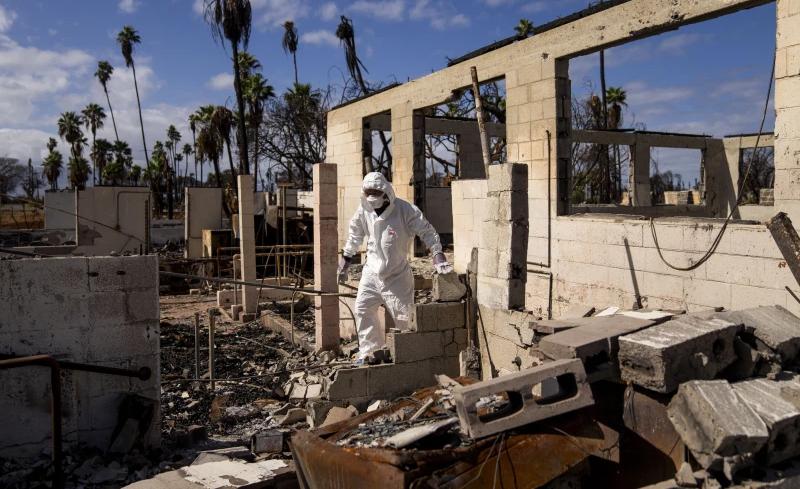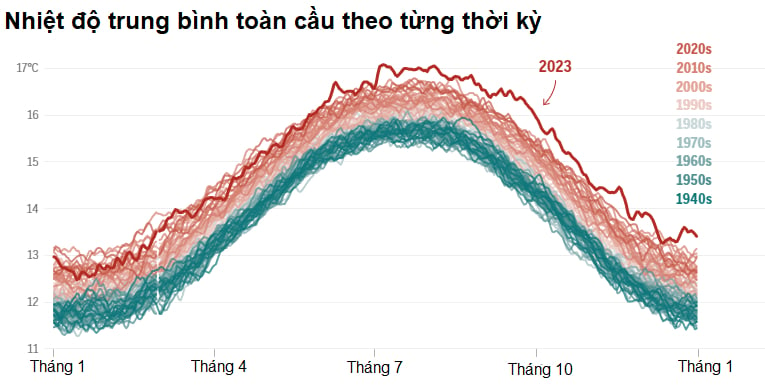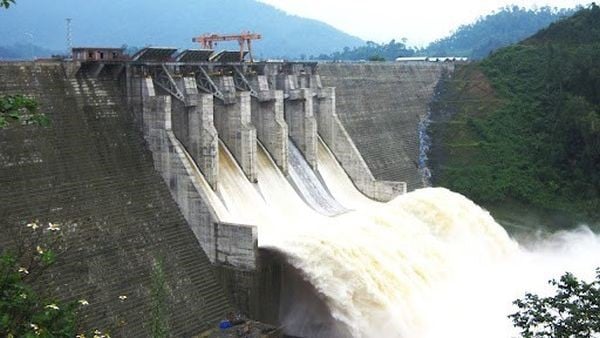Most scientists are concerned that climate change has already reached the threshold of 1.5 degrees Celsius above pre-industrial levels. Warming air and oceans are creating more heat waves that are not only economically damaging but also deadly.
In addition, global warming increases the likelihood of natural disasters such as floods, droughts, hurricanes and wildfires. "The heat of the past year was a dramatic message from Mother Nature," said climate scientist Katharine Jacobs of the University of Arizona.

A temple in Lahaina, Hawaii was destroyed by a wildfire. Photo: AP
Unusual weather changes
According to the latest calculations on Friday (January 12) by leading meteorological agencies, the average global temperature in 2023 will be more than 0.15 degrees Celsius higher than the previous temperature record.
According to some scientists, the climate of 2023 has been moving in strange, unpredictable directions. When temperatures in 2023 suddenly and rapidly increased since mid-June, scientists questioned whether human-caused climate change and the natural El Niño phenomenon were being driven by a mysterious factor, or if “something more systematic was going on.”
The answer to that question may have to wait until late spring or early summer, when the strong El Niño is expected to end. Scientists say that if ocean temperatures, including deep water, continue to stay warm through the summer, as they did in 2023, the situation will be very worrying.

2023 is officially the hottest year on record. Source: ERA5
Many scientists believe that greenhouse gases from burning fossil fuels are the leading cause of the world reaching temperatures that human civilization has never seen before, while the "very strong" El Nino phenomenon is the second biggest cause.
Speaking of the weather in 2023, NASA's chief climatologist Gavin Schmidt said 2023 is a very strange year. "The more you look into it, the more unclear it becomes."
One of the biggest uncertainties is when the heatwave will begin in 2023, according to Schmidt and Samantha Burgess, deputy director of the Copernicus Climate Service in Europe. Typically, temperatures peak in late winter and spring (winter and spring in the U.S. end in late March and late June, respectively). But the heatwave of 2023 started around June and lasted for several months at record levels.
1.5°C target difficult to achieve
According to calculations by the US National Oceanic and Atmospheric Administration (NOAA), the average temperature of the Earth in 2023 is 15.08 degrees Celsius, 0.15 degrees Celsius hotter than the record in 2016 and 1.35 degrees Celsius hotter than the pre-industrial period.

A woman uses a fan to block the sun in Madrid, Spain. Photo: AP
Combining measurements released Friday with calculations from Japan and Europe released earlier this month, the World Meteorological Organization pegged 2023 at 1.45 degrees Celsius hotter than pre-industrial temperatures.
Many climate scientists see little hope of limiting warming to the 1.5 degrees Celsius called for in the 2015 Paris agreement, the goal aimed at preventing the worst consequences of climate change.
"I think it's unrealistic to think that we can limit warming to 1.5 degrees Celsius," said Jennifer Francis, a scientist at the Woodwell Climate Research Center.
Both NASA and NOAA say the past 10 years (2014 to 2023) were the 10 hottest years they have ever measured. This is the third time in the past eight years that global temperature records have been set.
The biggest concern isn’t that the record was broken last year, but that it keeps getting broken so often, says Arizona State University scientist Randall Cerveny. “To me, the rate of change is what’s most alarming,” Cerveny says.
“This is just the beginning of what could happen in the future, especially if we continue to fail to cut carbon dioxide emissions in a timely manner,” said Cornell University climate scientist Natalie Mahowald.
Not only Ms. Mahowald, climate scientist Kim Cobb of Brown University also expressed: "I have been worried since the early 1990s. Now I am more worried than ever. My worry increases every year as global emissions go in the wrong direction."
Hoai Phuong (according to AP)
Source



![[Photo] General Secretary To Lam receives US Ambassador to Vietnam Marc E. Knapper](https://vstatic.vietnam.vn/vietnam/resource/IMAGE/2025/3/31/5ee45ded5fd548a685618a0b67c42970)
![[Photo] Prime Minister Pham Minh Chinh receives delegation of leaders of US universities](https://vstatic.vietnam.vn/vietnam/resource/IMAGE/2025/3/31/8be7f6be90624512b385fd1690124eaa)
![[Photo] 2nd Conference of the Party Executive Committee of Central Party Agencies](https://vstatic.vietnam.vn/vietnam/resource/IMAGE/2025/3/31/8f85b88962b34701ac511682b09b1e0d)

![[Photo] Speeding up construction of Ring Road 3 and Bien Hoa-Vung Tau Expressway](https://vstatic.vietnam.vn/vietnam/resource/IMAGE/2025/3/31/f1431fbe7d604caba041f84a718ccef7)

























































































![[REVIEW OCOP] An Lanh Huong Vet Yen Cat](https://vstatic.vietnam.vn/vietnam/resource/IMAGE/2025/3/27/c25032328e9a47be9991d5be7c0cad8c)

Comment (0)